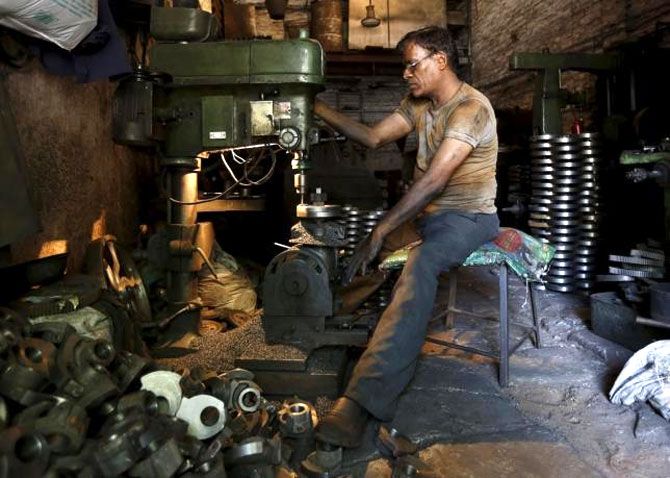On paper, contract workers can’t be denied social security benefits. But these remain paper promises.

The aftermath of the pandemic is expected to lead to a dramatic shift in the composition of India’s 470 million-strong workforce with companies relying more on contract workers to lower fixed costs.
But let’s face it: the law governing contract workers is the rotten apple in labour legislation and everyone became witness to it during the nationwide lockdown.
The migrant workers’ crisis is also the tragedy of contract workers, who have been growing in numbers over the years.
The share of contract workers in total organised manufacturing sector employment jumped from 15.5 per cent in 2000-01 to 27.9 per cent in 2015-16, according to an Indian Council for Research and International Economic Relations’ paper published in January 2019.
Hiring a contract worker involves a triangular relationship: principal employer, contractor (or manpower supply agency) and worker.
Legally, if migrant workers are to get the benefits of the labour laws, including displacement and journey allowance, they need to be hired through the contractors.
After the government imposed a lockdown at four hours’ notice, the first person to abandon the workers was the contractor.
Agencies hiring at least 20 contract workers are covered under the Contract Labour (Abolition and Regulation) Act, 1970.
States such as Rajasthan and Madhya Pradesh have increased the threshold to 50 so that fewer companies or agencies are governed by the law.
Firms face the incentive of staying small to stay under the radar of complex labour laws.
This has led to the mushrooming of thousands of fly-by-night contractors who hire workers at the minimum wage, and abandon them when business takes a hit.
This is the reality despite legal safeguards.
For instance, temporary and permanent workers doing the same job must have wage parity; the government can abolish contract workers if the job is found to be perennial and the employer has to step in if contractors fail to provide basic facilities and wages.
On paper, contract workers can’t be denied social security benefits. But these remain paper promises.
Supreme Court rulings have mostly favoured the employers.
As a result, employers are free to decide if the work performed by the two categories of workers is similar or not and even when the government abolishes contract workers in certain areas, the employer doesn’t have to bring them on payrolls.
In a 2009 judgment, the SC ruled that the “ultimate supervision and control (of contract workers) lies with a contractor.”
Contract workers are also outside the purview of the retrenchment or lay-off and trade union laws.
So what are the entry criteria for contractors?
Unlike China and Vietnam, none. It depends upon the discretion of the authorities.
The real challenge for contractors is to obtain a licence, along with depositing security fees, which varies with the number of workers employed.
In China, “dispatch employees (temporary workers)” can be hired only by contractors with a minimum capital of 2 million yuan ($200,000) and fixed office.
In Vietnam, from January 2021, outsourcing firms will have to make an escrow deposit of 2 billion Vietnamese dong ($85,000) and the firm’s bank will pay salaries to contract workers as a safety net.
In India, the tiresome licensing process is an incentive to flout it.
Contractors have to obtain multiple licences for each work order within a state and separate licences for operating in various states (even if it’s for the same organisation).
The employers have to give contractors a certificate for each work order.
The tenure of the licence differs among states.
Every time there is a change in the headcount, the contractor has to go back to authorities to update the licence owing to the fee structure attached to it - a process as good as applying for a fresh licence.
The starting point of labour reform is to ensure that contractors are encouraged to come under the purview of the authorities and are accountable for their actions.
The government has proposed a pan-India licence with a five-year validity in the Occupational Safety, Health and Working Conditions Code, 2019.
But it fails to mention the conditions that contractors need to follow.
Contractors, however, do have to inform the authorities about any work order they get during the five-year tenure, failing which their licence will be cancelled.
The proposal offers contractors an escape route, however.
If contractors do not meet the entry requirements set out in the rules, they may apply for a “work-specific licence” which can be renewed from time-to-time - effectively reverting to the old system.
The code, whose purpose was to simplify laws, employs complex text.
The contractor will have to read the rule book if he supplies manpower to different firms in multiple states to gauge who will be the licensing authority: the central or the state government.
The proposed law also gives sweeping powers to the governments to exempt certain establishments or contractors from all provisions of the law “in case of an emergency”.
All of this points to the urgent need to create a simple regime that clearly sets out accountability for the employer and contractors and a single licensing authority.
A mechanism to enable contract workers to get their statutory dues, including wages, in case contractors abscond is also vital, as recent experience has shown.
A key reason companies are finding it hard to find workers, after the national lockdown was lifted, is that the workers were employed through contractors and had no direct links with the principal employers who could now offer better terms if they wished.
One sound alternative to the contractor system is fixed-term contracts - a globally established practice.
The government has proposed fixed-term employment in the Industrial Relations Code, 2019, to facilitate a way in which companies can directly hire temporary workers on a pre-determined tenure of contract.
Employees hired on a fixed-term contract will be given equal benefits as regular workers - in fact, more as gratuity will be available to them on a pro-rata basis even if they do not complete a minimum of five years of work.
But there are two holes in the new system.
First, there is no job security, the sine qua non of better labour productivity.
Second, contracts can be renewed any number of times and the government has quietly scrapped a proposal for mandated firms not to convert existing contract employees into fixed-term workers - again, a contrast to China or Vietnam.
Photograph: Reuters












 © 2025
© 2025